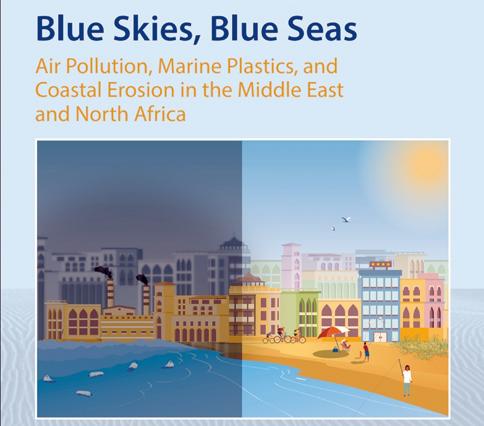You are here
World Bank Group report sounds alarm on high pollution in MENA
By Rayya Al Muheisen - Feb 07,2022 - Last updated at Feb 07,2022

The cover of the report
AMMAN — The Middle East and North Africa (MENA) are among the world’s most polluted countries, yet if a green economy policy is adopted challenges can turn into opportunities in the region, according to a report by the World Bank Group.
The report, titled “Blue Skies, Blue Seas Air Pollution, Marine Plastics, and Coastal Erosion in the Middle East and North Africa”, highlights the main development challenges and opportunities the region faces as it strives to meet the evolving needs of its people.
Air pollution levels in the MENA’s largest cities are among the highest in the world, with the average urban resident breathing in air that exceeds the level of pollutants considered safe by the WHO by more than 10 times, the report said.
Moreover, air pollution causes around 270,000 deaths a year, higher than traffic accident-related deaths, diabetes, malaria TB, HIV/AIDS and acute hepatitis combined, according to the report.
“The average resident in the MENA region contributes more than 6kg of plastic waste to the sea,” the report noted.
To address marine plastic pollution, the report recommended improving solid waste management, creating reliable market structures for recycling markets and increased collaboration with the private sector for plastic alternatives, while also reducing fossil fuel subsidies, which artificially reduce the price of plastics.
“The average MENA resident is ill at least 60 days in their lifetime due to exposure to elevated air pollution levels,” the report indicated.
The report noted that the economic costs of air pollution in the MENA region are immense, around $141 billion per year.
“MENA’s shorelines are eroding at the second fastest rate globally,” the report highlighted, stating that the disappearance of MENA’s beaches threatens livelihoods, particularly among the poor. Shrinking coastlines impair fisheries, reduce coastal tourism and compromise related activities, the report observed.
“The Mediterranean is among the world’s most plastic-polluted seas,” the report mentioned.
Among other environmental shortfalls, the MENA region has been the world’s slowest region in decoupling economic growth from air pollutants, and it has yet to decouple economic growth from carbon emissions.
Related Articles
AMMAN — The Jordan University of Science and Technology (JUST) and the University of California in San Diego have jointly obtained $3-millio
PARIS — Air pollution was fingered for the first time as a major contributor to death and disability caused by stroke, especially in develop
PARIS — The world must halve single-use plastics and slash throwaway consumption to stem the tide of environmental pollution, according to a











